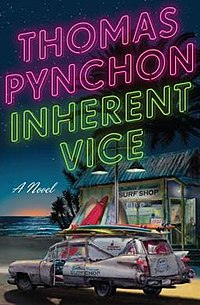
I remembered someone reading this book and feeling ambivalent about it last year, but honestly I thought it was Andy (because it is, frankly, Andy and my kind of book). Turns out it was Zeke, who was anything but ambivalent about it, in that he seems to have hated it with the special kind of hate metalheads reserve for their wimpy friends and neighbors. Fair enough, Zeke, fair enough. Unfortunately, for me, while my reasons were different, my conclusion about this book is largely the same.
Even though by the end I was pretty over it, this book is almost worth reading for the premise alone. The idea is that the titular "Boy Detective" is a detective wunderkind, solving all sorts of crimes before Bar Mitzvah age with his beautiful sister and fat best friend. Time passes, as it is want to do, and when the Boy Detective leaves for college, his sister kills herself, an act which is a mystery to the BD, and one which he will spend the rest of his life trying to solve. He has his own suicidal nervous breakdown, and decides it is safer to spend the rest of his life in an institution largely populated by the criminal masterminds who he helped catch in his youth and their prime. For anyone (me) who grew up reading Encyclopedia Brown (which is, I think, clearly the model for the BD...he is also like Nancy Drew and the Hardy Boys, obviously, but the HB show up as thinly disguised brothers I think named the Handy Boys, who know work as the ticket taker and asst. manager, respectively, at a movie theater).
I am all for post-modernism, especially in literature. And this book is full of it, which out of order chapters, digressions, footnotes, and a special decoder ring in the back which lets you, the reader, help the boy detetcive, at the urging of the narrator. The narrator also often pauses the action to talk directly to you, the reader, using the second person. This is the largest problem I had with the book, and it got to be an overwhelmingly large one. Joe Meno has a great gift, I think, for premises and for capturing small, achingly sad moments and crafting pathetic, heartbreaking characters. But the man cannot get out of his own way to tell the story he has set up so well. While I am sure it is done slightly more artfully than this, Meno (or his narrator) comments in the action in such a blindlingly obvious way that it really starts to feel that at the end of any sad chapter, there are a few sentences where we leave the BD, alone in his room or whatever, and the narrator says "Isn't that sad? Isn't your heartbreaking? Wasn't that last scene just so sad and awesome and you have feelings that you are feeling now don't you? And they are sad feelings? Because of the story I am telling you" etc. I know its sad. I just read it. And if I didn't think it was sad, you, Joe Meno, have frankly failed and no amount of you asking me if I found your sad story sad will make me go, "Oh, that was supposed to be sad? I get it now!". While I imagine that was not his intent, it feels like it sometimes, and the meta-commentary that points out exactly what I am feeling is so alienating and distracting that it prevents the book from being intimate for any sustained stretch, which is what it needs to be affecting when its story is so small and precious.
And as for precious, the book drags on and on (I felt like I should've been done at about the halfway point, and its less than 300 pages long) but it really lost me with one chapter towards the end. The BD and his object of affection finally get together, after much mumblecore posturing. The chapter is nice but I was, as I said, mostly over it. The problem was the entirety of the next chapter was roughly the following (i am paraphrasing, but not as much as it might seem):
"Did you read that chapter while holding hands with someone you care about? No? Well, go find someone to hold hands with and reread the chapter? wasn't that better?'
UGH.
 "Don't make your own life your project in your own life: total waste of time.
"Don't make your own life your project in your own life: total waste of time. 











